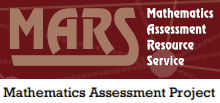|
This MAP Project Portfolio consists of the current set of documents listed below (this list will continue to be added to as the project progresses). You may use these links below or the links in left column.
This document is a 2 page brief. To learn how students and teachers benefit from the Mathematics Assessment Project (MAP) Classroom Challenges, Inverness Research interviewed twelve MAP pilot teachers in July 2012. Teachers' experiences using Classroom Challnges (CCs) with students were universally positive, revealing ten top reasons why secondary math teachers should use them. Each of the ten reasons summarized within the document is followed by a quote from the pilot teacher interviews.
Abstract and report
Return to top
In July 2012, Inverness Research conducted lengthy interviews with 12 middle and high school teachers who piloted the Math Assessment Project (MAP) Classroom Challenges in California, Michigan, and Rhode Island. These teachers collectively piloted more than 50 Classroom Challenges with their students over three years. As demonstrated in the interview quotes used throughout this document, their voices speak to the questions a typical middle or high school math teacher might have about the MAP Classroom Challenges.
Abstract and report
Return to top
The Mathematics Assessment Project team invited Inverness Research to help portray the MAP Classroom Challenges to a spectrum of potential users, educators at all levels of the system interested in realizing the vision of the CCSSM in their local settings. As part of that effort, Inverness Research conducted in-depth interviews with 12 of the pilot teachers in July 2012. All twelve teachers piloted at least 5 Classroom Challenges, and many used as many as 25 over a two- to three-year period. This report presents a detailed description of the findings gleaned from those conversations.
Abstract and report
Return to top
In the spring of 2014 surveys were administered to over 600 students who attended mathematics classes taught either by MAP pilot teachers or teachers who participated in professional development offered by the Mathematics Design Collaborative in Colorado and Louisiana. The survey focused on students' experiences engaging in the Classroom Challenges, in particular their assessment of their growth and development in key areas related to CCSSM mathematical practices. This paper describes the results of students' survey ratings and draws on the written comments and explications they were encouraged to share.
Abstract and report
Return to top
Five nationally recognized mathematics educators served as "Key Classroom Observers" for the Mathematics Assessment Project in the development of their formative assessment lessons known as Classroom Challenges (CCs). These educators' many years of working with students, teachers, school and district administrators, as well as state and national policy makers provided a rich intellectual context for their observations of the Classroom Challenges. Over the 5-year development process, each observed approximately 30 classrooms annually -- a total of 750 classroom sessions of first-hand experience with the CCs.
Abstract and report
Return to top
The collaboration among three distinct but closely aligned groups offers a promising implementation strategy for bringing MAP Classroom Challenges to scale. It also serves as an illustration of how innovative curricular materials such as the Classroom Challenges can play a pivotal role in furthering the Bill & Melinda Gates Foundation's goal of having 80% of low-income and minority students ready for college by 2025.
The cooperating groups included: 1) the Mathematics Assessment Project (MAP) that developed innovative curricular materials, the Classroom Challenges (CCs), centered on the eight Standards for Mathematical Practice, 2) the Mathematics Design Collaborative (MDC) that provided teachers and administrators in selected districts in Colorado and Louisiana with professional development focused on the CCs, and 3) the school districts that created supportive contexts for instructional improvement.
In July 2013, Inverness Research conducted a survey of teachers and administrators in Colorado and Louisiana who participated in the professional activities centered on the MAP Classroom Challenges and provided by the Mathematics Design Collaborative. These survey results, bolstered by interviews with key project leaders, show the efficacy of a particular large-scale implementation strategy aimed at helping teachers understand and practice rigorous new state standards, similar to and including the Common Core State Standards for Mathematics (CCSSM).
Abstract and report
Return to top
|
